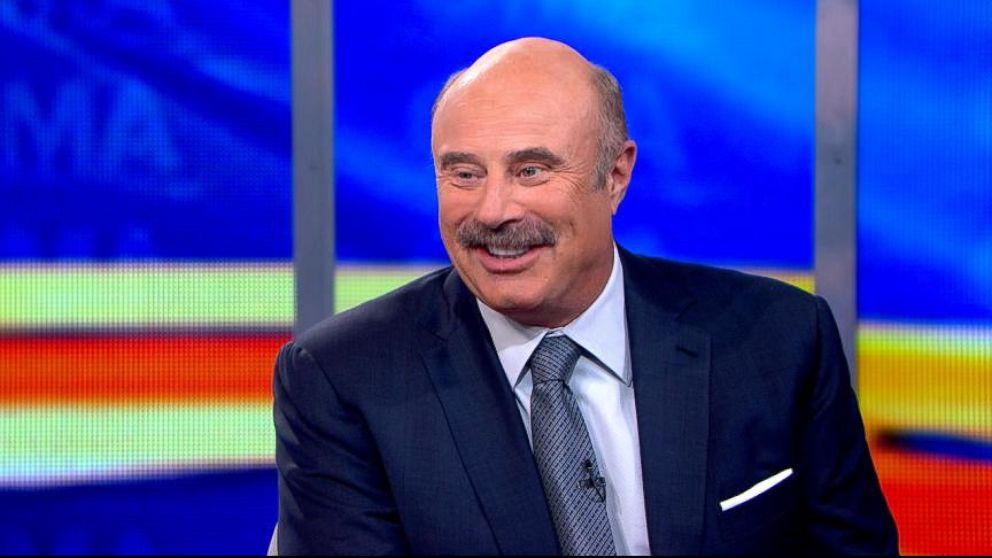Is Dr Phil A Psychologist? The Truth Behind His Credentials
Ever wondered if Dr Phil is really a psychologist? You're not alone. Millions of viewers have tuned in to his show over the years, seeking advice on everything from relationship drama to personal growth. But is he the real deal when it comes to psychology? Let's dive deep into this question and uncover the truth behind Dr Phil's credentials.
Dr Phil McGraw has become a household name, thanks to his no-nonsense approach and down-to-earth style. He's the guy who calls it like it is, offering straight-up advice that cuts through the fluff. But as much as we love his straightforwardness, the question remains: is Dr Phil a psychologist, or is he just a really good talk show host?
In this article, we'll explore his background, credentials, and the role psychology plays in his career. Whether you're a die-hard fan or just curious about his expertise, you're in for a ride. Let's get to the bottom of this and see if Dr Phil truly deserves the title of psychologist.
Read also:Where Are They Now The Cast Of Hercules The Legendary Journeys
Who is Dr Phil?
Before we dive into whether Dr Phil is a psychologist, let's first get to know the man behind the show. Dr Phil McGraw is more than just a talk show host; he's a media personality, author, and entrepreneur who has made a name for himself in the world of self-help and personal development.
Biography of Dr Phil McGraw
Born on September 1, 1950, in Vinita, Oklahoma, Dr Phil grew up in a small town where he developed a passion for understanding people and their behavior. His journey to becoming a household name started early, as he was always interested in helping others navigate their challenges.
Here's a quick look at his personal background:
| Full Name | Philip Calvin McGraw |
|---|---|
| Date of Birth | September 1, 1950 |
| Place of Birth | Vinita, Oklahoma |
| Education | Ph.D. in Clinical Psychology |
| Spouse | Roz McGraw |
| Children | Two sons: Jay McGraw and Jordan McGraw |
Dr Phil's Educational Background
So, is Dr Phil a psychologist? To answer that, we need to look at his educational journey. Dr Phil holds a Ph.D. in Clinical Psychology, which he earned from the University of North Texas. This degree gives him the credentials to practice psychology, but there's more to the story.
Dr Phil's education didn't stop there. He also pursued a career in business and entrepreneurship, which has played a significant role in his success. His ability to blend psychology with practical advice has set him apart from other talk show hosts.
Key Points About Dr Phil's Education
- University of North Texas: Where he earned his Ph.D. in Clinical Psychology.
- Business Acumen: Dr Phil's entrepreneurial skills have allowed him to expand his influence beyond the world of psychology.
- Continued Learning: Dr Phil stays updated with the latest research and trends in psychology, ensuring his advice remains relevant.
Is Dr Phil a Licensed Psychologist?
Now, let's address the elephant in the room: is Dr Phil a licensed psychologist? The answer is yes, but with a twist. Dr Phil did hold a license to practice psychology in Texas, but he let it lapse in the early 2000s. Why? Well, he decided to focus on his media career rather than maintaining an active practice.
Read also:Elizabeth Montgomery The Witch Behind The Screen And Her Reallife Love Story
While he's no longer a practicing psychologist, his education and experience still give him the knowledge to offer insightful advice. It's like having a degree in something but choosing to pursue a different path. Dr Phil's decision to let his license lapse doesn't diminish his expertise; it just shows where his priorities lie.
Why Did Dr Phil Let His License Lapse?
Dr Phil made a conscious decision to let his psychology license lapse because he wanted to focus on his media career. Here's why:
- Media Focus: Dr Phil's talk show and other media projects required his full attention.
- Entrepreneurial Ventures: He wanted to explore business opportunities related to personal development.
- Reaching a Wider Audience: By focusing on media, Dr Phil could help more people than he could through traditional therapy.
Dr Phil's Approach to Psychology
Dr Phil's approach to psychology is unique. He combines his clinical knowledge with practical advice that resonates with everyday people. His no-nonsense style and ability to cut through the fluff make him a favorite among viewers seeking straightforward solutions.
But what exactly does his approach entail? Let's break it down:
Key Aspects of Dr Phil's Psychology
- Empathy with a Dose of Reality: Dr Phil understands the importance of empathy but also believes in calling it like it is.
- Focus on Actionable Solutions: His advice is practical and actionable, helping people take steps toward positive change.
- Encouraging Accountability: Dr Phil emphasizes personal responsibility and encourages people to take ownership of their lives.
Dr Phil's Impact on Psychology
Love him or hate him, there's no denying that Dr Phil has had a significant impact on the field of psychology. His show has brought psychological concepts to the masses, making them more accessible and understandable.
But has this impact been positive or negative? Critics argue that Dr Phil's approach oversimplifies complex psychological issues, while supporters believe he demystifies psychology for the average person. Let's explore both sides of the argument.
Positive Impact of Dr Phil
- Demystifying Psychology: Dr Phil makes psychology accessible to people who might not otherwise engage with it.
- Encouraging Self-Reflection: His show prompts viewers to reflect on their own lives and behaviors.
- Highlighting Important Issues: Dr Phil tackles topics like domestic violence, addiction, and mental health, bringing them to the forefront of public discussion.
Potential Drawbacks
- Oversimplification: Critics argue that Dr Phil sometimes oversimplifies complex psychological issues, which can be misleading.
- Media Sensationalism: Some believe his show prioritizes entertainment over genuine psychological insight.
- Public Perception: Dr Phil's media presence might lead some to believe that psychology is all about quick fixes, which isn't always the case.
Dr Phil's Career Beyond Psychology
While Dr Phil's psychology background is undoubtedly a key part of his career, it's not the only thing he's known for. His media empire extends far beyond the world of psychology, encompassing books, TV shows, and even a production company.
Here's a look at some of his notable ventures:
Notable Media Projects
- The Dr Phil Show: His popular talk show that has been running for over 20 years.
- Books: Dr Phil has authored several best-selling books on topics like relationships, parenting, and personal growth.
- Production Company: He co-founded Stage 29 Productions, which produces a variety of TV shows and documentaries.
Dr Phil's Influence on Pop Culture
Dr Phil's influence extends beyond psychology and into the realm of pop culture. His show has become a cultural phenomenon, with catchphrases like "You can't change what you don't acknowledge" becoming part of the public lexicon.
But what makes Dr Phil such a cultural icon? It's his ability to connect with people on a personal level, offering advice that feels both relatable and actionable. Whether you're tuning in for entertainment or seeking genuine guidance, Dr Phil delivers.
Key Reasons for Dr Phil's Popularity
- Relatability: Dr Phil's down-to-earth approach resonates with viewers from all walks of life.
- Authenticity: His honesty and straightforwardness make him a trusted figure in the media landscape.
- Impactful Storytelling: Dr Phil excels at telling stories that captivate and inspire his audience.
Dr Phil's Contributions to Mental Health Awareness
One of Dr Phil's most significant contributions is his role in raising awareness about mental health. Through his show and various media projects, he has tackled topics like depression, anxiety, and addiction, helping to reduce the stigma surrounding mental health issues.
But how effective has he been in this area? Critics and supporters alike acknowledge that Dr Phil has played a crucial role in bringing mental health into the public conversation. His efforts have encouraged countless people to seek help and support for their mental health challenges.
Dr Phil's Role in Mental Health Advocacy
- Reducing Stigma: Dr Phil has helped normalize discussions about mental health, making it easier for people to seek help.
- Providing Resources: His show often highlights resources and support systems for those struggling with mental health issues.
- Empowering Viewers: Dr Phil encourages viewers to take control of their mental health and seek professional help when needed.
Conclusion: Is Dr Phil a Psychologist?
So, is Dr Phil a psychologist? The answer is yes, but with some caveats. Dr Phil holds a Ph.D. in Clinical Psychology and has the knowledge and expertise to offer valuable advice. However, he's no longer a practicing psychologist, having let his license lapse to focus on his media career.
Regardless of his current status, Dr Phil's impact on psychology and mental health awareness cannot be overstated. His ability to connect with people and offer practical advice has made him a trusted figure in the world of personal development.
So, what's next? If you found this article helpful, why not share it with a friend or leave a comment below? And if you're looking for more insights into psychology and mental health, be sure to explore our other articles. Let's keep the conversation going and help each other grow!
Table of Contents
- Who is Dr Phil?
- Dr Phil's Educational Background
- Is Dr Phil a Licensed Psychologist?
- Dr Phil's Approach to Psychology
- Dr Phil's Impact on Psychology
- Dr Phil's Career Beyond Psychology
- Dr Phil's Influence on Pop Culture
- Dr Phil's Contributions to Mental Health Awareness
- Conclusion: Is Dr Phil a Psychologist?
Article Recommendations


